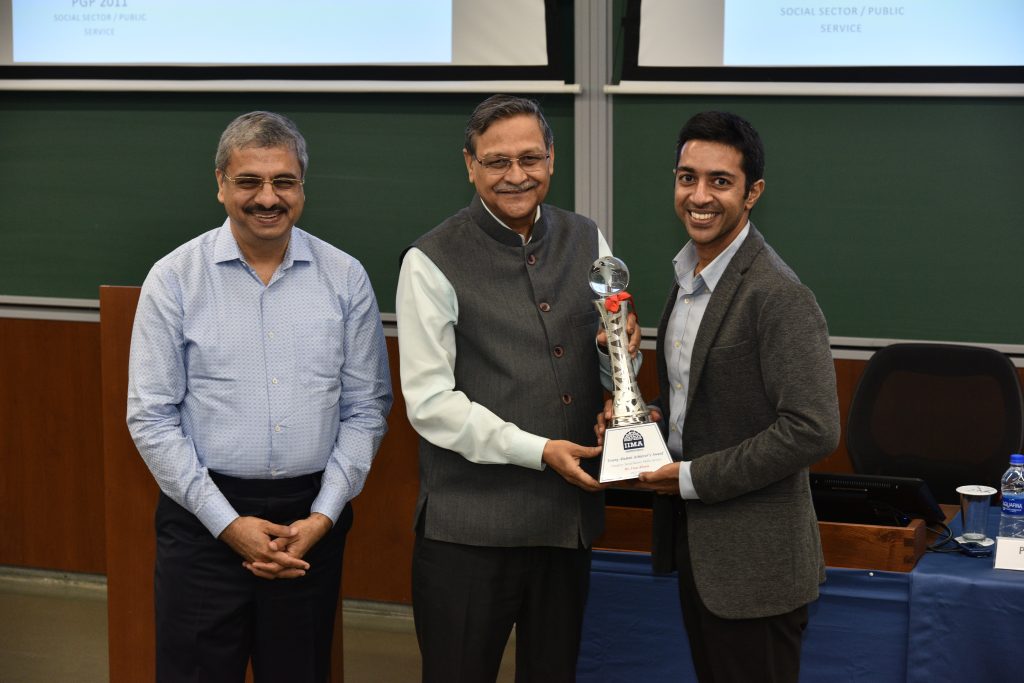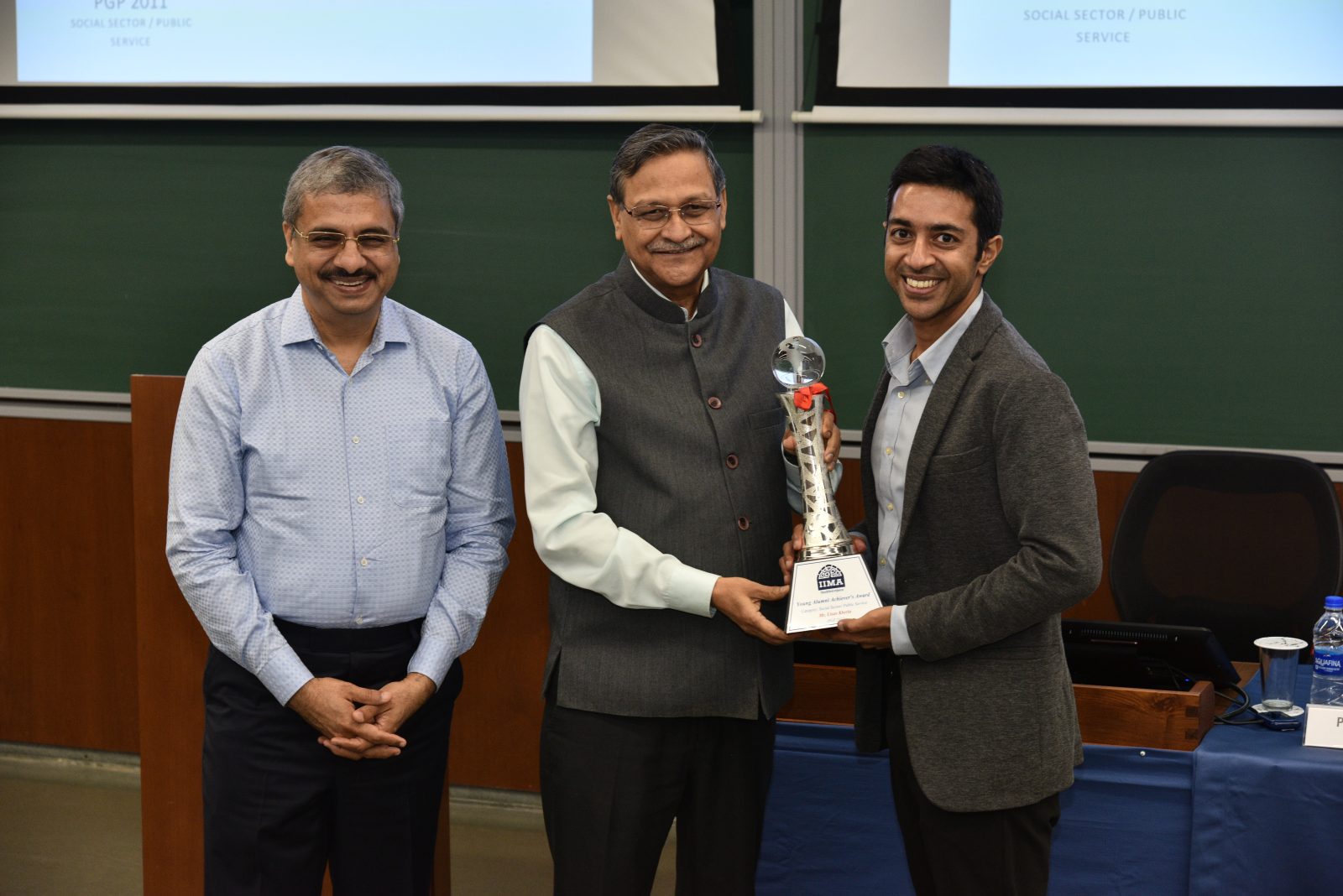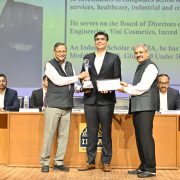
SOCIAL SECTOR/PUBLIC SERVICE
Utsav Kheria: PGP 2011 (Co-Founder, Rocket Learning)
Utsav Kheria is the Co-founder of Rocket Learning, a non-profit organisation that is focussed on transforming India’s publicly-run daycare network to joyful learning hubs so that every child in India has access to good quality early-childhood education. Through Rocket Learning, Utsav has created a platform that provides high-quality educational content and teacher training to government run anganwadi centres, reaching over 2.5 million children in 10 states. Utsav has been instrumental in scaling the organisation and promoting the human-centred design used in their curriculum.
Rocket Learning has empowered 100,000 Anganwadi workers through a dynamic hybrid model, leading to 70% of students in their program being school-ready by age 6, delivering a powerful 12 times social return on investment. Rocket Learning has become a case study at Harvard Business School and Stanford Business School, and will soon be taught in Indian business schools
Rocket Learning’s strength lies in its collaborations with the government. The organisation has partnered with state governments, Ministry of Women and Child Development, Ministry of Education and MIT J PAL and reaches 11% of the public pre-schools and teachers. Due to its success, Rocket Learning was one of the eight organisations selected globally for the inaugural cohort of the LSE 100x Impact Accelerator and one of the six winners of WISE awards.
Congratulations Utsav, on winning the Young Alumni Achiever’s Award. How is it to be back on the campus?
It feels really good. I remember, while speaking yesterday, I mentioned some of these things that I think IIMA has given us a lot. To start with it gave us a lot of confidence, a lot of belief to follow any path that we want to follow. In many ways, I followed a path which could be considered different. It feels great to be recognised by IIMA, I hold it in very high esteem. The fact that the Institute is recognising you for your efforts feels very special. I also feel very lucky as there could be so many of us sitting here receiving the award. So I feel very grateful and lucky.
You had a corporate job before getting into Edubridge and then starting your own social entrepreneurship. So what got you interested in the social sector?
I think in many ways, I knew this is something I wanted to do. When I was younger, I didn’t know how to really do this, so it was almost taken for granted that I would just do a corporate job. Just pre business school I did a year in the UK, which was my first job. In many ways, it sort of just exposed me to a different life, to what a developed country could be like. So I think that experience was really good. At IIMA, I did my internship in consulting, and then a year of consulting post IIMA, I think I knew that it wasn’t really what I wanted to do in life but I also had loans to pay off, so I took that path, and then as soon as I paid off my loan, I made my way back to India and started working in the education space. I have always believed that education is a great equaliser. Even at IIMA there were people from very different backgrounds, people with very different beliefs and thoughts all coming together. That is what makes it a fantastic platform. I think corporate jobs also taught me things like how to build a great product, how to build for a lot of people. That combined with my interest in education allowed me to believe that we can create something which can be an equaliser at scale. So I’m imagining multiple IIMAs for children of tomorrow.
Education is a tricky field to show impact and results, how did you decide to work in the field and show impact?
Education is a very complicated problem. It is difficult to measure and to see impact. I think the only thing we can always try and do is make something better than it was. I don’t think there will ever be a situation where education is fixed and we are as good as we can ever be. I don’t think we will ever be in this situation across the world, but I do think we can keep making improvements. I do think, and that applies to every institute, maybe including IIM Ahmedabad. The problem that we are trying to solve is that a lot of children today in India do not have access to any sort of learning in the earliest years. So if we can build something which is really good for children at scale across the country. I think that can be fantastic. Will it completely solve the problem? Probably not. But will it be far better than what it was? I really think so.
You work with around 2.5 million children in 10 states. So can you talk about the operations of how rocket learning works, and how have you translated it across different states and regions and languages?
We set up Rocket learning about 4.5 years back. We were very keen from the beginning to partner with the governments. A lot of the children who we want to work with, who we do work with today, go to go to government schools, or the government run daycare centre–Anganwadis. They are the children who today don’t have access to very good quality education though it’s a great place for safekeeping they are fed, which is fantastic. I think we made a great start there as a society but to really transform education at scale, we are very keen to partner with the government. We were also very keen to leverage technology in a very big way and to build with the community. If you’re building something for the community, I don’t think you can build without the community being a core part of it or and being involved. So just these were some of the tenets. Now, the key caregivers of children, one is obviously the teachers, or the daycare center workers, i.e. the anganwadi workers, and the second is parents. So we run programs for both of them. So with anganwadi workers, it’s an upskilling program, plus guiding them on what they can teach in the in the anganwadi on a daily basis, linked with their state curriculum and with parents is just giving them a couple of ideas or activities that they can do with their children on a daily basis. So just to make it really easy for them and really fun for them and their children to do activities daily with simple household objects. This really enables both learning within the classroom and at home. And the third is we work with the government very closely now in these 10 states on multiple things. We partner with the central government as well. So we work on policy with them and we help execute a lot of that at the state level as well.
The outcome of your initiative is 70% of the children who have used the skills are ready for school, compared to 50% which is the national average. So can you tell us, how have you achieved this?
We have seen a very strong impact of our work and that gives me a lot of confidence in our work, in what we are doing, in scaling this up further. I think 2-3 things that we have seen are about half the children who are entering school being ready for school. In our program, we typically see about 70% as you said, right, very simply, it means that, you know, 70% of children can recognize letters. They know the numbers. They’re more socially and emotionally ready for school. I mentioned that we work with the Anganwadi workers and parents. I actually think some of these things are equally important, because these are structural behavioral shifts, which hopefully will last very long. We hope to push it to about [school ready rate] at 80- 85% in the next couple of years. We really want to sort of partner with more state governments and make all of the work that we do actually much more accessible to other organisations and governments. So even if, let’s say, rocket learning cannot be everywhere at least our programme can be there in some shape and form, if that would be useful for the kids.
What is your advice for anyone who wants to follow your path, work in the social sector and create impact?
Look, I genuinely believe that everyone has their own path. Some people discover it a little early, some people discover it a little later, but I feel that you know it’s never too early or too late to follow your path but I do believe that the that the earlier you know, if you realize it at a particular stage in life, you shouldn’t wait to get into that. I have seen far too often. So the student I think is a PGP-2 student who asked me this question yesterday, if he’s very keen, I would totally suggest that you need not wait. People do say, “Let me work in the corporate sort of world for a few years to pick up some skills”. I think the social sector teaches you as many skills, if not more. Of course, if you have financial constraints or family constraints, I understand you also need to be practical, but keeping that aside, I think the moment you realise your path, I am a big believer in following that no matter how unconventional or how different it may Be. I do think that unconventional paths are also fascinating. I love hearing about unconventional journeys. So the only thing I would say is, “If your path is different, unconventional, please do follow your journey as early as possible, the moment you realise it.”



